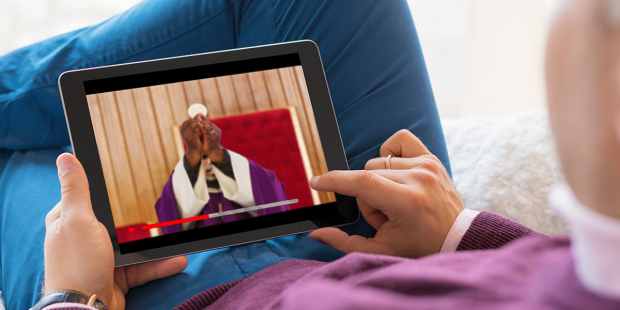
A new poll commissioned by the Iona Institute looks at what happens to religious practice in a lockdown situation. In spite of the fact that public worship suspended, many people are tuning into religious ceremonies in various ways and almost a fifth of people (18pc) say they are praying more than usual.
Weekly Mass attendance in Ireland is roughly 30pc, and the poll finds that a corresponding number – 27pc of respondents – watched or listened to one religious service, thanks to TV, radio or the internet.
What this shows is that religious practice is adapting to the new situation and so far, people are not drifting away.
We are being greatly assisted in this crisis through the availability of a range of religious services. Masses are now broadcast online at any hour of the day (Here is a very comprehensive list: https://churchservices.tv/timetable/) And also rosary, adoration, stations of the Cross, meditations, can be accessed online or on radio and TV.
Tuning in to religious talks and services was already a possibility for
those who were stuck at home because of illness. Now it is becoming the
new normal, even if only temporarily.
Our routines have changed. Tragedies make us sense our limits and ponder about what is really essential.
“I feel this lockdown will give us all more time to reflect on what life is all about, and not least remind us that God, and not us, is in ultimate charge.”, wrote one of our supporters in response to the poll.
In dire times we need consolation and religious practices helps not only our souls but also improves our mental health. (Here is a study produced by Prof. Patricia Casey on behalf of the Iona Institute.)
For believers, faith gives sense to suffering and death. It helps to cope with bereavement effects, especially now that many die in isolation and, because of the current restrictions, they can’t be properly mourned.
Thirty-one pc of respondents believe that we will be more spiritual when the lockdown will end.
If the communal dimension of the celebration is missing and the active participation is severed, some families have discovered new forms of spirituality, by praying together and establishing new good habits.
Technologies are often presented as disruptive of family life and spirituality but the poll shows that they could be valuable means.
Sacraments are irreplaceable and we need to remember that these are temporary solutions in exceptional circumstances. Hopefully churches will be re-open soon, with the due precautions.
According to the poll not only religiosity is blooming during these difficult times but also other fundamental elements of our lives. Eight-five pc of respondents believe that we will value family more after the lockdown ends. Distance has made many realise the importance of their relationships, now physically separated. We discover that what was considered granted can be easily lost.
The lockdown can be detrimental for some families in crisis but it is also pushing other to revisit relationships that fell apart.
Three-quarters of those who took part in the poll think we will value the elderly more as a result of the lockdown. They have suffered more than any other group because of the virus, and there is a sense that many, particularly those in nursing homes, have been neglected and abandoned. This health crisis has highlighted a poor attitude towards the elderly that needs to be challenged and changed.
Some good will come from the difficult times we are experiencing and the poll commissioned by the Iona Institute gives some reasons to hope.
(The poll was conducted by Amarach Research in early to mid-April and was based on a nationally representative sample of over 1,000 people).
Nessun commento:
Posta un commento